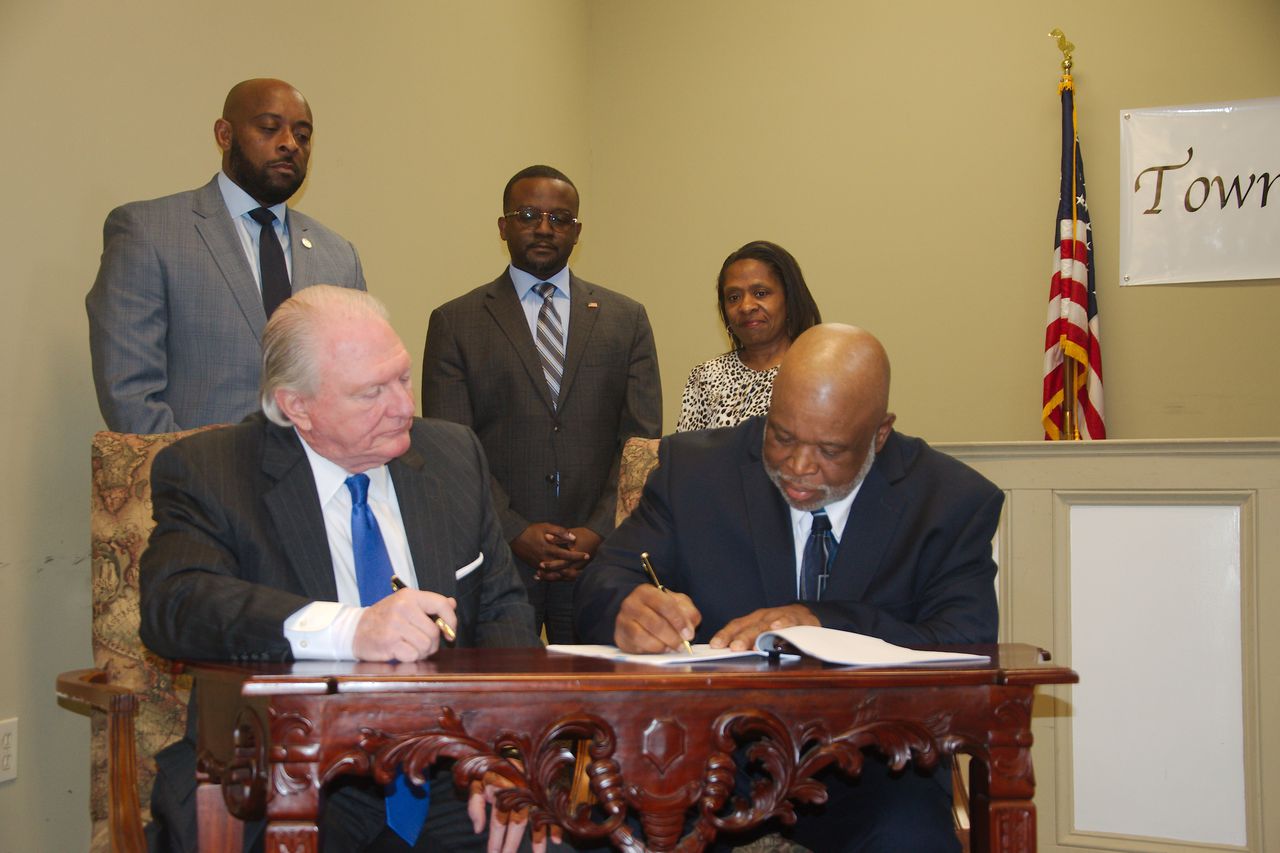Alabama Black Belt town gets $10 million to salvage failing sewer system
A small community in Alabama’s Black Belt is getting $10 million to repair a failing sewer system that residents say has been holding the town back for decades.
State and federal officials traveled to the small town of Hayneville in Lowndes County Friday, to officially sign paperwork designating $10 million in funding to repair and upgrade the city’s sewer system.
Hayneville Mayor Jimmy Davis said the town wouldn’t have the money to “even think about a project like this,” without the federal assistance.
“This money means everything to our town,” Davis said. “I am overjoyed for our residents who have had to go without adequate sewer service, but will soon get a sewer system they deserve.”
Lance LeFleur, director of the Alabama Department of Environmental Management, said the funding will make a difference in the lives of the residents, many of whom live in places where traditional septic tank systems don’t work because of the soil.
“This is the highlight of my year so far, and probably the highlight of the last several years,” LeFleur said. “We are happy to see it happen and it means so much to the people of the Hayneville area.
6
White House pledges to fix Alabama Black Belt sewage crisis
“They are going to have relief from a problem they’ve been experiencing for generations.”
In Alabama’s Black Belt, the combination of thick clay soils, low population density and high poverty make wastewater issues a long-standing and expensive problem. Most septic tank systems don’t work properly in soils with poor drainage like the Black Belt, and many residents live miles away from the nearest central sewer line.
As a result many residents are stuck with septic systems that work ineffectively or not at all, and some have resorted to “straight-piping,” or discharging waste directly into the open areas near their homes.
“We estimate that there are more than 30,000 homes that have failing or non-existent wastewater treatment,” LeFleur said. “And that’s a conservative estimate.”
Daniel Blackman, EPA’s regional administrator for the Southeast, said the awards show that the Biden Administration is making good on promises to resolve long-standing sewage problems in Alabama’s Black Belt.
“A child should never have to grow up in the United States living in conditions where sanitation equity, access to clean water is an issue,” Blackman said. “But in 2023, we’re still talking about communities right here in the U.S. where one part of the state thrives, and other parts of the state, unfortunately, they’re struggling.
“Our role is to figure out how we can implement funding and resources to make sure that the problem doesn’t persist.”
Davis said that he hears complaints “all the time” from residents about sewer leaks, back-ups or septic tanks that aren’t working properly.
“We constantly get work orders for septic tank problems, every day,” he said. “Hopefully this will improve a lot of it and free up some labor for us to do other things.”
He hopes the improved sewer system can help attract new businesses and residents to the area, which has a declining population.
“Our town suffers because you can’t get any industry or business in here because of our lack of being able to handle the sewage,” Davis said.
“We’ve got Family Dollar, Dollar General, Ace Hardware, a service station, a couple of restaurants, But if we had more, it’d be more tax revenue.”
16
EPA administrator visits Alabama Black Belt
The funding is coming from two federal laws passed since 2021, the Bipartisan Infrastructure Law (BIL) and the American Rescue Plan Act (ARPA). ADEM is administering those funds in Alabama and expects to award about $1 billion in infrastructure funding over the next several years to address water and sewer issues in Alabama.
Of that total, $225 million came Alabama’s ARPA funding was allocated for water and sewer projects by Gov. Kay Ivey and the Alabama Legislature last year. ADEM also expects to receive a total of $765 million in BIL funding over the next five years.
ADEM has already announced more than $348 million in funding to water and sewer systems around the state, with a special focus on the areas that show the greatest need. But those projects only reflect the water systems in the more dire need, LeFleur said.
Some of that funding is in the form of grants, others are low- to no-interest loans that can be paid back over time.
In addition to Hayneville’s sewer project, the town is receiving $2.9 million for improvements to its drinking water system.
Also in Lowndes County, the town of Lowndesboro will receive $1 million for water system improvements, and the Lowndes County Water Authority will receive $735,000.
In addition, ADEM awarded $2.2 million to the Alabama Department of Public Health for a demonstration project in Lowndes County using special septic systems designed to cope with the dense Black belt soil.
ADEM has already received more than $3 billion in funding applications from water systems around the state looking to make improvements. LeFleur said ADEM will continue to fund projects from that list on a needs basis as they receive funding from the federal government or state government.
“Of the remaining proposals that have been presented to us we have prioritized those with the most needy being at the top of the list and on down,” LeFleur said.
